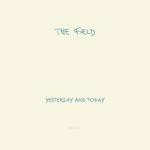
The Field Yesterday and Today
(Kompakt)
One of the best things about truly great music is the way in which it can bookend, parenthesize, envelop, and otherwise soundtrack life. In 2007 I was preparing for a big move, from living in one continent to living in another. In March of that year I heard about an album by a relatively unknown artist on the German Kompakt label. Kompakt releases some remarkable music, most of which is techno, although normally fairly distinct and interesting takes on the genre. When I finally managed to acquire From Here We Go Sublime by The Field, it didn’t disappoint. Ambient, rhythmic, ecstatic, it was an album that I didn’t tire of. Mostly created from distorted, unrecognizable, sampled loops from well-known artists, it was music that kept propelling the listener forward while retaining that key element of mystery that makes music repeatable, and replayable. From Here We Go Sublime sound-tracked the months before I left perfectly because in its layered, textured, brilliance it became organic and adaptable, it adjusted to my changing emotional state.
It’s now 2009, I’ve moved and settled, and now a new Field album enters my life. Yesterday and Today is a different record from its predecessor. While both albums run at an hour long each, Yesterday and Today has only six tracks where the previous record had ten. This is not the only change; where FHWGS contained mutated samples from famous songs that were so altered as to be completely unidentifiable, Y&T actually contains a cover, Everybody’s Gotta Learn Sometime by The Korgis (the most recognizable form of which is likely the Beck version featured at the end of Michel Gondry’s Eternal Sunshine of the Spotless Mind). Similarly, this time The Field, or Axel Willner as he presumably likes to be sometimes known, has used live instrumentation more, most notably on the title track where Battles drummer John Stanier contributes.
Does this mean that Y&T is a major departure? Not really. FHWGS was so excellently sequenced and hypnotic that the listener was never aware of concrete breaks between the tracks. It also had a fairly natural, swelling feel to it, and so the new organic textures never feel more than a fluent progression from the previous sound. Perhaps the most surprising change is Everybody’s Gotta Learn Sometimes, but not for the reasons you might expect. On paper, it doesn’t look like a Field track, being described in interviews by Willner as a drunken decision that turned out well. While the verse is retained, the chorus is cleverly substituted for a rushing emotional instrumental burst. The most remarkable part is that it not only works but completely transcends the confines of the songs original structure and history. Willner’s genius move is to manage to make the song both recognizable as a cover and as a Field track, no mean feat. The song climaxes repeating the chorus motif while a simple, effective keyboard rift plays in a high register.
Elsewhere, the album feels at once familiar and different. Opening track, I Have the Moon, You Have the Internet sets the pace for the first half of the record well with cascading, crescendoing keyboard and deep, organic pulses. Leave It and, The More That I Do retain the hypnotic enormity of previous Field classics Over the Ice and Sun & Ice, while trading those songs’ heavy ambience again for something with an earthier thud. Yesterday and Today loops and builds Stanier’s drums over cut up vocal loops and ambient rushes to a measured, almost kraut-rocky finish. Mammoth, 15-minute long, closer Sequenced combines tremeloed dark keyboard riffs with a funky, Lindstrom-esque bass-line.
There is so much in this album, so much depth, and so many things to discover that I am looking forward to it being the soundtrack for whatever life throws my way for the next while. Yesterday and Today is a brilliant sequel, one that retains the strongest elements of its predecessor whilst bravely pushing forward into new territory. This is clever, rewarding music that, like all the best music, transcends its own components and particular genre. Willner has effortlessly created what may very well turn out to be the soundtrack to a lot of different summers this year.
3 June, 2009 - 15:40 — Nick Fenn